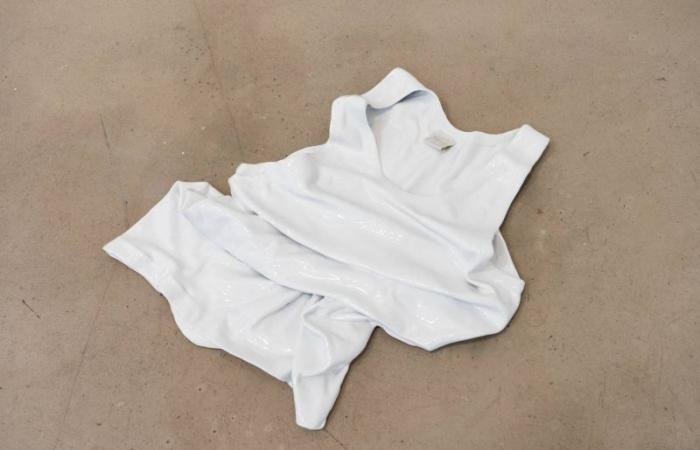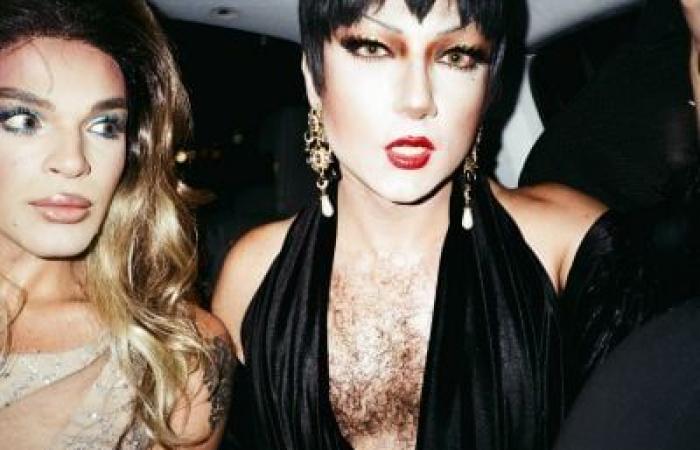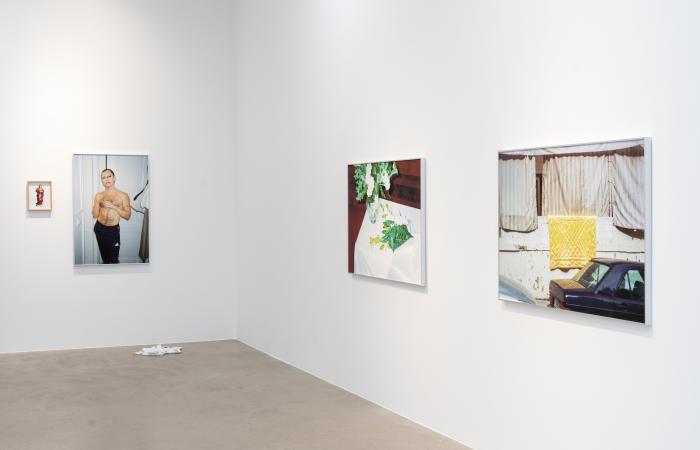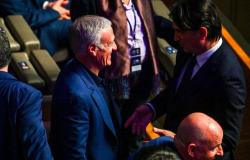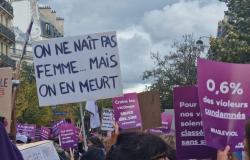In the mazes of the port area, in Beirut, where wholesalers and shipchandlers pile up one after the other in the noise of always intense activity, pushing open the door of this small white space that is the Marfa’ gallery, it’s is finding a quiet breath in the ambient hubbub. In this “haven” – a less chaotic definition of the reality of ports – Mohammad Abdouni’s seemingly innocuous photos and sculptures grab you by the throat after a time of contemplation.
In this view of the exhibition of the works of Mohammad Abdouni, to your left, a virile ride on a plain. Next to it, a solitary horse, as if left out of this virile choreography. Courtesy of the Marfa’ gallery
A silent father, secretly a poet
Visual cantor of the queer chronicle, this artist and photographer from the Bekaa has often felt disconnected from his environment and his belonging. His relationship with his father, a taciturn man from this plain where one rarely expresses one’s feelings, where men must wear a mask of seriousness which defines their virility and their sense of responsibility, seemed distant to him, difficult to establish due to of a seemingly insurmountable generational and cultural divide. There is, however, an undeniable connection between their two approaches. A poet, this father pours into his words all the tenderness and all the solitude that he prevents himself from expressing. It is in poetry that these two meet. Kamel Abdouni, born in 1956, began writing in his early thirties without ever publishing his works, considering them too personal. Authorized to read these intimate texts of his father, Mohammad managed to persuade him to lend him six of them which would serve as the basis for the exhibition. Barren Seeds. Through these writings, Abdouni discovers an unexpected kinship in their common quest for identity and belonging, a similarity in warding off fears, which leads to an emotional reconciliation through their two forms of expression as well as a new understanding of the other. The result is a dialogue where their distinct approaches to life’s uncertainties come together – sometimes with playful satire and other times offering insightful reflections on past hurts.
Read also
The man who photographs the Lebanese queer community “so as not to forget”
Questions on the notion of virility and other trembling lines
To your left, a virile ride on a plain. Next to it, a solitary horse, as if left out of this virile choreography. And also a vast desolate landscape in front of which stands a porcelain figurine representing one of these men wrapped in a white loincloth, an involuntarily effeminate attitude. To your right, a still life of flowers on a tablecloth, a bouquet unmade or in the process of being made. And also one of these traditional plaids, unchanged since the great era when the Bekaa hosted a vast section of the Silk Road, but yellow like the sun under which it airs a little between old striped curtains. In front of you, the artist Anya Kneez (pronounced “on your knees”, with the Brooklyn accent where Anya spent part of her life). The drag queen is seized backstage, leaving the show, makeup in disarray and lipstick smeared. Next to her, a “holy” figurine, one of those plaster reproductions to which miracles are attributed, but made by artificial intelligence. Almost invisible, placed on the ground, the reproduction of a tank top from the Lebanese brand Hanin, a classic of men’s underwear. Substrate of a traumatic event, this XXL tank top is lined with a boy’s underwear exhibited in France, as a way of keeping the two parts of this unspoken drama at a distance from each other and thus neutralizing it. . In a hidden room, a video that isn’t really one. Fixed image, or barely moving, of a beach restaurant table, plastic chair and table, crossed cutlery on an empty plate waiting for the customer, glass ashtray and shadows of solitude. The exhibition continues in the parallel room. A strange Ophelia bathes, eyes closed, in a body of calm water, her white dress floating around her. Next to it, on a white plate, a devoured fish lies with its bones. We will also see textured images of algae or grass pushed by the current. And also photos taken in Istanbul where Abdouni lives part of the year, bus stop, veiled women, trivial images like all the others, with no other meaning than the one we want to give them, but which together form an environment familiar, an in-between that attracts the eye without knowing why, but perhaps precisely because it has this fragility of the moment before it passes.
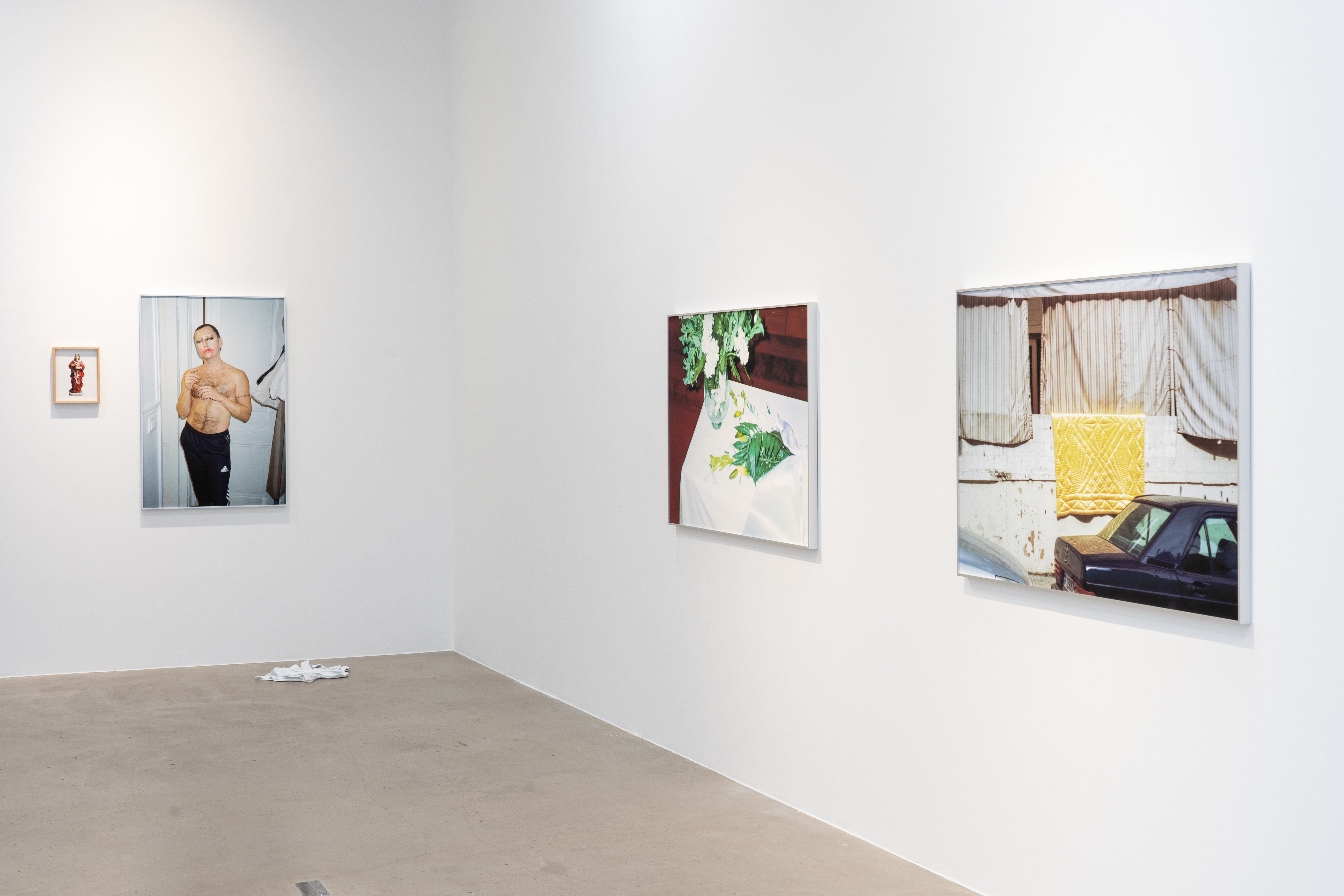 In Mohammad Abdouni’s photo on the left wall, drag queen Anya is captured backstage, leaving the show. Courtesy of Marfa’ Gallery
In Mohammad Abdouni’s photo on the left wall, drag queen Anya is captured backstage, leaving the show. Courtesy of Marfa’ Gallery
There is an attempt without illusions to capture in these works, between clichés and vanities, an immediate or distant past which is capable of seeding the present or the future. But the title of the exhibition confirms that time sometimes resembles this still image presented as a video: an ephemeral which never ceases to repeat itself, sterile like the son’s reproduction of the father’s melancholy.
Photographer, director, Mohammad Abdouni is also an exhibition curator. He directs the creation of the photography magazine Cold Cuts dedicated to exploring queer cultures in the MENA region. Winner of the 2023 Production Aid from Lafayette Anticipations, awarded to one of the artists in the Émergence d’art Basel Paris sector, a solo exhibition under the title Soft Skills (soft skills) is dedicated to him at the moment, and until November 17, at Lafayette Anticipations in the Marais.
“Barren Seeds”, Marfa’ gallery, until January 24, 2025.
In the mazes of the port area, in Beirut, where wholesalers and shipchandlers pile up one after the other in the noise of always intense activity, pushing open the door of this small white space that is the Marfa’ gallery, it’s is finding a quiet breath in the ambient hubbub. In this “haven” – a less chaotic definition of the reality of ports – the photos and…
- -
